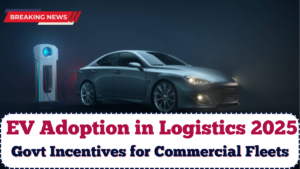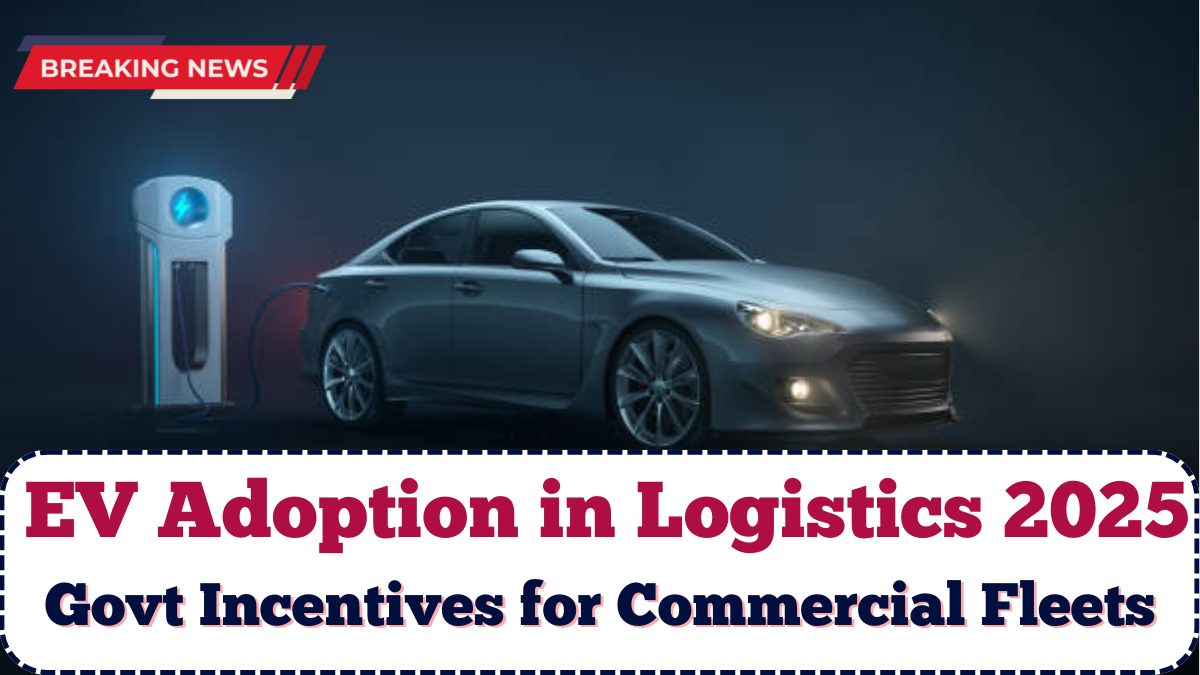The Logistics EV Adoption India 2025 initiative is transforming the future of transportation in the commercial sector. With rising fuel costs and environmental concerns, the Indian government has rolled out powerful incentives to encourage businesses to transition their fleets to electric vehicles (EVs). Logistics companies — from last-mile delivery services to heavy freight transporters — are actively integrating EVs into their operations.
This green shift is not just a trend but a strategic policy move under India’s electric mobility roadmap. Backed by subsidies, tax benefits, and dedicated charging infrastructure, the EV logistics revolution is in full swing across major cities like Delhi, Mumbai, Bengaluru, Hyderabad, and Ahmedabad.

Government Incentives for Commercial EV Fleets
To promote electric trucks and delivery vehicles, the government has launched multiple schemes and support systems aimed specifically at the logistics and freight sector. These incentives are designed to reduce the high upfront cost of EVs and ease the adoption process for fleet operators.
Key government incentives in 2025 include:
-
FAME-II Subsidy Extension: Up to ₹10 lakh per electric truck for approved models
-
GST Reduction: EVs taxed at 5% (vs 28% for diesel trucks)
-
Green Number Plates: For identification and exemption in low-emission zones
-
Road Tax & Registration Waiver: 100% exemption in several states
-
Scrappage Incentive: For replacing old diesel vehicles with electric ones
-
Priority in Government Tenders: Preference for EV-based fleets in logistics contracts
| Incentive Type | Benefit Description |
|---|---|
| Purchase Subsidy | ₹3,000 to ₹10,00,000 depending on vehicle category |
| Registration Fees Waived | Applies in states like Delhi, Gujarat, Maharashtra |
| Income Tax Benefits | Depreciation up to 40% on EV fleet vehicles |
| Interest Subvention | Reduced rates on EV commercial vehicle loans |
These offers make commercial fleet India operators more confident about moving toward full electrification.
Why Logistics Companies Are Switching to EVs
The shift to electric trucks and vans is largely driven by cost savings, government policy, and pressure to meet ESG (Environmental, Social, Governance) targets. Businesses now realize that EVs are not just eco-friendly but also offer long-term operational advantages.
Benefits of switching:
-
Lower fuel and maintenance costs
-
Zero tailpipe emissions, helping meet sustainability goals
-
Enhanced brand image as a clean energy company
-
Regulatory advantages including access to restricted urban zones
-
Better driver comfort and reduced noise pollution
With new models entering the market and technology maturing, logistics companies in e-commerce, retail, and transport sectors are placing bulk orders for EVs to future-proof their operations.
EV Models and Charging Ecosystem for Logistics
Several automakers and EV startups have launched electric trucks, vans, and 3-wheelers tailored for the logistics industry. These vehicles are equipped with large payload capacities, fast-charging capabilities, and GPS-integrated route optimization.
Top EV models in logistics:
-
Tata Ultra T.7 Electric – medium-duty truck for intracity deliveries
-
Mahindra Treo Zor – three-wheeler cargo for last-mile logistics
-
Euler HiLoad EV – commercial-grade electric three-wheeler
-
Omega Seiki Rage+ – delivery EV with swappable battery tech
-
Switch Mobility eLCV – light commercial vehicle with fast charging
In parallel, private players and government-backed companies are expanding the EV logistics charging infrastructure. Multi-vehicle charging hubs are now operational at key warehouse and industrial zones across India.
Future Scope of EV Adoption in Commercial Fleet India
The Logistics EV Adoption India 2025 strategy is already showing results, with hundreds of companies signing MoUs and fleet conversion roadmaps. State transport departments are offering fast-track registration, and many banks now have EV-specific credit lines for fleet acquisition.
Key developments:
-
Flipkart and Amazon have committed to 100% EV delivery fleets by 2030
-
Zomato and Swiggy are onboarding EV-only delivery partners in metros
-
EV leasing companies are offering low EMI plans for small businesses
-
State EV policies now include fleet electrification targets
All of this signals a future where India’s commercial fleet India sector becomes a global model in clean logistics.
FAQs
What incentives are available for logistics companies adopting EVs in 2025?
Companies can avail FAME-II subsidies, GST cuts, tax waivers, low-interest loans, and scrappage benefits on replacing old diesel vehicles.
Are there electric trucks suitable for heavy-duty logistics in India?
Yes, models like Tata Ultra T.7 Electric and Ashok Leyland’s eLCVs are designed for heavy logistics and come with high payload capacity.
Do commercial EVs get road tax exemption?
Yes, most states including Delhi, Gujarat, and Maharashtra offer 100% exemption on road tax and registration fees for commercial EVs.
Is charging infrastructure available for logistics EVs?
Yes, dedicated fleet charging hubs are being set up at warehouse zones, along highways, and industrial areas across metro cities.
Can small delivery businesses afford to switch to EVs?
Yes, with subsidies, leasing models, and low-interest loans, even small businesses can now adopt EVs at a manageable cost.
Are electric commercial vehicles eligible for GST benefits?
Absolutely. EVs attract only 5% GST compared to 28% on petrol/diesel vehicles, making them significantly more affordable in the long run.
Click here to know more.
Aanchal is a passionate writer with a keen interest in storytelling, content creation, and creative expression. She enjoys exploring diverse topics and crafting engaging narratives that captivate readers.
